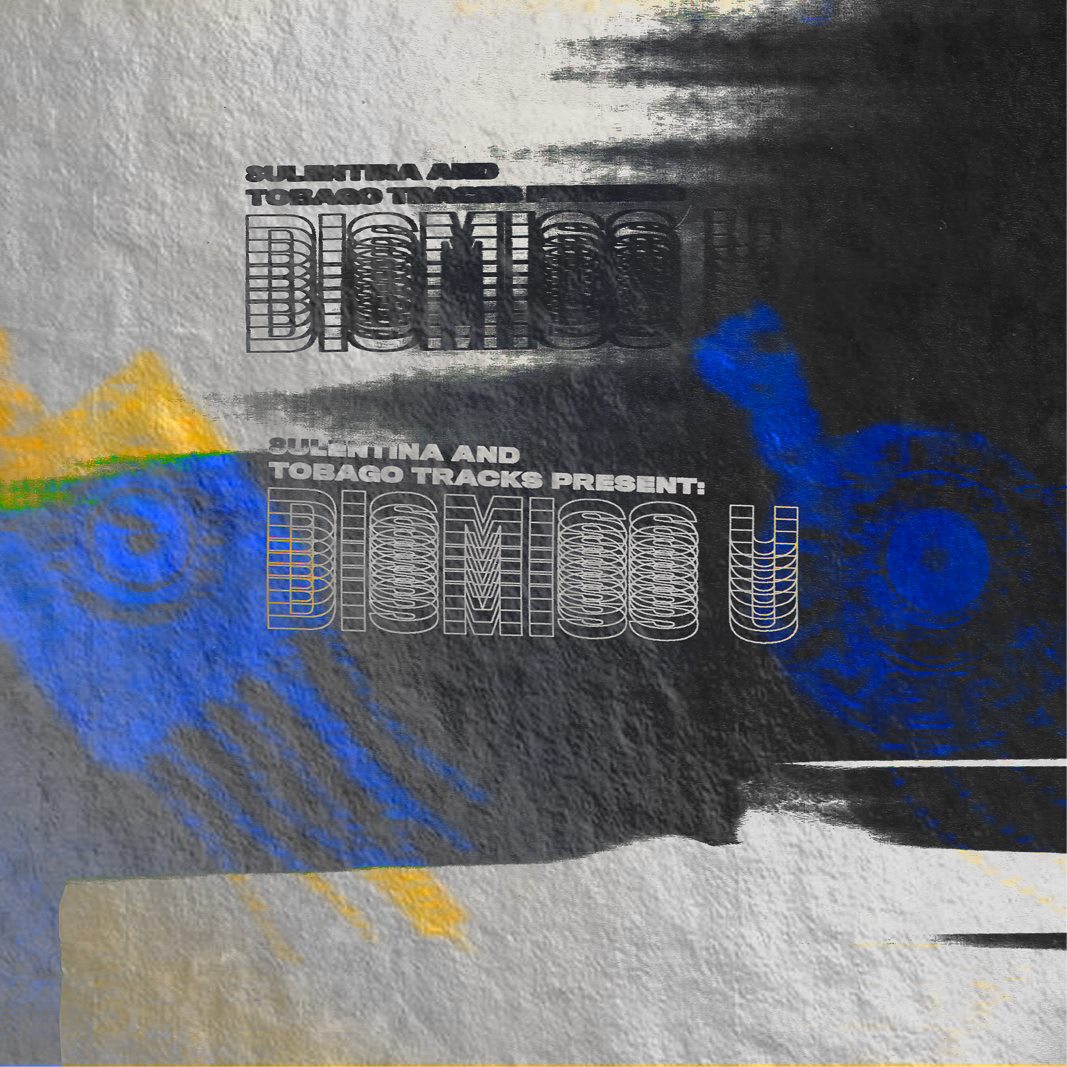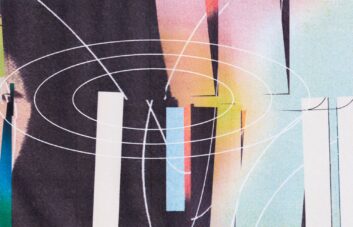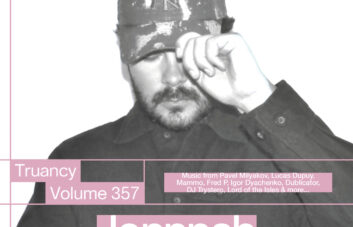Released in April, Tobago Tracks’ DISMISS U compilation is one of the most vital of the year. Assembled by producer, DJ and installation artist 8ULENTINA, the compilation showcases seven femme artists weaving diasporic narratives into dance tracks that reference, subvert and/or ignore Western club tropes. Although the release is cohesive, it resists easy categorisation: featured on the compilation is everything from Missy Elliot bootlegs to abstract collage work, while its artists are geographically dispersed with many having non-intersecting roots. Perhaps the connecting thread is one of approach: all the artists featured are explicitly bringing their heritage to bear on the music they make and refusing to smother crucial aspects of their identity to fit into a white-washed dance music culture. It’s a project that deserves further unpacking, so we got in touch with 8ULENTINA to find out more about the background and intention behind the compilation.
How did the idea of working with Tobago Tracks on a compilation come about? “After I made my TT mix Robert aka DJ Pitch from Tobago Tracks reached out to me and asked me to to work with them for a compilation release. I was excited about the artists they were collaborating with at the time and they have been supporting my work for a while. I knew we could have a solid collaborative dialogue from afar.”
How did you go about selecting the artists for inclusion on the compilation and what’s your relationship to them? “All of the artists on DISMISS U are artists whose work I’ve been following for the past year or so. Some of them are friends of mine who I’ve collaborated with before and some of them I’ve kept in contact with online. foozool and I have been collaborating for a year now on mixes and events, we currently throw Club Chai together in Oakland. Kibz Selcuk is one of my best friends whose work I’ve been following since I found her work on tumblr, her video work involves immaculately mixed tracks and edits. Her track “Bülent + Nicki Dick in Your Face TFTTF” is an addition to her TFTTF series, which she describes as “a mainly video based work that looks into the politics of flow and femininity”. I also connected with DJ Haram and Nargiz online initially, and had the opportunity to play three shows with them on the east coast for our #KEFTOUR in Philadelphia, Baltimore and Philadelphia. After #KEFTOUR I kept in touch with both of them and continued to follow their work. I first heard Maieli’s mixes on soundcloud and then her edits, I loved how she was working with her relationship to Desi and Latin sounds. I saw MOHINI’S work on Tumblr and was really into the digital collage work she was doing, then started to hear more of her tracks. I love how both her sound work and visual work use a processes of abstraction and collage while addressing Afro-Arab diaspora.”
Can you tell us a little about your party with foozool, Club Chai? How did you begin to collaborate? “Me and foozool met about 2 years ago, our first collaboration was our border_convos mix. We continued to be friends and collaborate after that mix and threw a monthly party called Night Forms in collaboration with Browntourage for eight months at a bar in Oakland. We wanted to move away from bars to open up more experimental options for performers. We conceptualized Club Chai together and the first one was in January with DJ Haram, Turbo Sonidero, Jasmine Infiniti, foozool and me. We have always been interested in creating spaces where non western music and western club music could intersect especially since most of the middle eastern music we both grew up with is dance music but isn’t always put in a club context. Club Chai dismisses genres and is an event that often centers diasporic narratives, women and trans artists, DJs and producers.”
Outside of music you also work in installation art: do these practices intersect in any way for you? “My work is about diasporic fantasy and is heavily based in abstraction and archiving. My visual work and sound work are all a part of the same practice for me although they don’t always exist in the same space. I just started a studio residency in Oakland at Real Time and Space for this month and next month. I’m looking forward to the opportunity to work on sound and sculpture in the same space.”
When I interviewed DJ Haram last year she talked about how her Identity Crisis mix series “discuss[es] how music from Middle Eastern pop culture and folk tradition interact with Black American dance music and culture.” A similar intersection with Black music occurs within DISMISS U as well: obviously there’s DJ Haram’s nods to Jersey club, but more explicitly, Kibz Selcuk’s track beautifully repurposes “Come On A Cone” and Maieli blends Bollywood film music with Missy Elliott. Was this an intentional aim with the compilation, a happy coincidence or something else entirely? “I told all the producers involved about my ideas for the comp and told them to make whatever they wanted, no genres or specific sound in mind, but I think that dance music and black music are inseparable, especially in America. Black people invented dance music so I think its important that non black people involved in dance music acknowledge this and respect it. Each producer is channeling sounds from their own diasporic narrative and that is intersecting with their local relationships to dance music in the west.”
In the press release it states “DISMISS U approaches sound/noise experimentation and diasporic narratives from an expansive yet dismissive perspective”: I was wondering if you could expand on this? In particular, for you, how does ‘dismissiveness’ inform and instantiate itself in the work? “For me dismissiveness is important in this project in how it ignores genres and structure. There is no single genre that ties all the tracks on the comp together. I’m interested in how each producer is sampling traditional or folk instruments while collapsing them into electronic sounds. When it comes to non western music production people are always jumping to exoticize, define and categorize it, especially when it’s being consumed in the West. I wanted this compilation to avoid those corny ways of categorizing non western aesthetics and sounds. All of the artists on this compilation have had to dismiss a lot of assumptions about their work to continue to make it.”
I’m also interested in the “false notions of solidarity” the press release alludes to: what do you perceive these notions to be and how are they damaging? “I think the internet can create a fake or simplified notion of solidarity amongst people of color and diasporic people. I am grateful for the ways I’ve connected with other diasporic people and like minded artists online but I think there’s a lot of generalizing that happens when it comes to middle eastern and non western politics on the internet. Acknowledging difference and privilege amongst each other’s varying struggles is really important to me, you can’t just repost or reblog solidarity for someone else’s pain and then move on. Lots of people fixate on the fact that I am Turkish and collaborate with foozool who is Armenian as if its some peace fantasy friendship but we are both very aware that our friendship doesn’t change the fact that the Turkish government still denies the Armenian Genocide and continues to oppress Armenians, Kurds, Alevis, Romani people, Syrian refugees and ethnic minorities that come into the country. It’s about supporting each other without generalizing or oversimplifying each others experiences.”
What can you tell us about your contribution to the compilation? “I’ve been thinking a lot about sound as an extension of my body, especially my experience as a diasporic person. Both DAF ATEŞ and Alevi Spiral address the tension, anxiety and distance I feel in that space. The folk instruments I am sampling are used in Alevi rituals, I’m creating my own ritual experience within these tracks and creating a relationship to a spirituality that I have an ancestral relationship to but access from a distance and through technology.”
Equally important are the artists on the compilation. For the uninitiated, here’s a primer on the producers behind DISMISS U.
foozool is co-creator and resident DJ of the Bay Area club night CLUB CHAI, a party she runs with 8ULENTINA. Over the last year they have invited the likes of False Witness, DJ Haram, Manara and Stud1nt to play. Outside of dance music she works as a curator, as well as a sound and video artist exploring “familial narratives, diasporic intimacy and memory”. Her music has an archival quality, with samples of the traditional Armenian music of her heritage rubbing shoulders with contemporary club tropes.
On her contribution to DISMISS U, foozool says: “In “Hishatak (memory)”, I sample and edit vocals from Komitas, Deradoorian, and instruments prominent in Armenian music and its surrounding regions, such as the duduk, tar, and dhol drums. Komitas was an Armenian priest, composer and musicologist who collected and transcribed thousands of pieces of Armenian and Kurdish folk music, more than half of which were destroyed during the 1915 genocide. As far as Komitas vocals, only a few recordings are left today. Throughout the track, and what emerges more so at the end, is a droning sound I recorded from inside St. Gregory the Illuminator Cathedral when I was in Yerevan, Armenia -“dham” (drone notes) are common in Armenian music, usually paired with the duduk to give a fuller sound. I wanted to have a clash of all these sounds, almost nightmare like, coming from different places (geographically far yet personal) that have shared long histories together, and bring different elements to it today.”
Maieli is a DJ and producer based in LA, fusing her Columbian and Indian roots on syncopated club tracks and dreamy rap beats. She has amassed a fearsome archive of tracks and mixes on her website: we particularly recommend her amazing contributions to Desi rapper Horsepowar’s Out2Lunch mixtape and her storming mix for Mishthi Music. On her contribution to DISMISS U she hits on all of these touch stones: an electro cumbia beat houses a conversation between Bollywood film music and Missy Elliot.
Nargiz is a DJ and producer based in New York. Originally from Azerbaijan, she’s lived back and forth between the US and various places in Asia. Whilst living in Tokyo she was part of the collective that programmed the Laguna Bass nights, one of the few parties in the city where contemporary club music from the UK and US could be heard. Having cut her teeth as a resident DJ there, she now runs Heat Ritual in New York City, a party that taps into the up-to-the-minute sounds of crews like NAAFI, KUNQ and Mixpak.
On her contribution to DISMISS U, Nargiz says: “Being able to experiment with non western sounds and styles on this track for the compilation was everything. I only know how to play keys in maqam scales, and I finally got to use them! Ignoring genres and standards made room for experimentation. I had just gotten back from visiting fam in Azerbaijan and had a lot of drums patterns on CDs, so I started off with chopping up a traditional Azeri drum loop and built from there. I made the track on the compilation while thinking about the style of meyxanas. Meyxana is an Azeri kind of performance, often compared to freestyle rap in the west, it’s carried through the night based on one drum pattern. Guests of a meyxana will pass a mic trying to jump in and rhyme, change topics, battle, pass on verses or chant to keep things going, but it’s the same one drum pattern that strings the mess together. In love with the all the intentions on this compilation …Ready for more!!”
Mohini is a French producer exploring her Afro-Arab roots through music. Her productions tap into many modes, including low slung FlyLo style beats, classic Chicago house and edits of Maghrebian music. Her contribution to the compilation is much more experimental than all of these, however. “3ala el amar” is an abstract soundscape filled with pitch shifted voices that has a lot in common with the pre-Far Side Virtual tape releases of James Ferraro, as well as the current output of his Skaters companion Spencer Clark.
On her contribution to DISMISS U, Mohini says: “My track is about the feeling of otherness and confusion. Being a place where people don’t talk the same language, and you are trying to communicate. It’s about suffering, the desperate calling upon God and screaming at the moon, saying ‘life is miserable, i am miserable’. It’s about outdoing yourself.”
Kibz Selcuk is a video, text and installation artist based in California but originally from Istanbul. Her contribution to DISMISS U is a chaotic bootleg of Nicki’s “Come On A Cone” instrumental, an audio extension of her video series TFTTF that explores “the politics of flow and feminity”.
DJ Haram is a producer and DJ working in and around Jersey club. Part of the rising Philadelphia collective/“club-not-club night” ATM, DJ Haram’s music takes in everything from experimental noise to party bangers. Her “Crisis” mixes are the perfect introduction to her work, each a fully formed articulation of her desire to fuse music of the Middle Eastern diaspora with East Coast club music. We profiled her for our Functions Of The Now series last year and in the time since we last met she’s gone from strength to strength, most recently joining feminist dance music collective Discwoman. She’ll be setting off on her first European tour with them this August and September.
On her contribution to DISMISS U, DJ Haram says: “SO FUCKING FUNNY (soap) ft. Moor Mother Goddess is about soap opera drama, when life is so confusing and aggravating that it has come to a laughable point. Running away. Getting played. Lol. More ft. Celline is about not having shit but knowing you deserve everything. DISMISS U is a fantasy about denial making ends meet.”
8ULENTINA & Tobago Tracks Present: DISMISS U is available to buy from Bandcamp. 8ULENTINA will be in London this weekend playing at Bala Club in Dalston and Caller Tune in Hackney Wick. Follow the links for tickets/more information.



